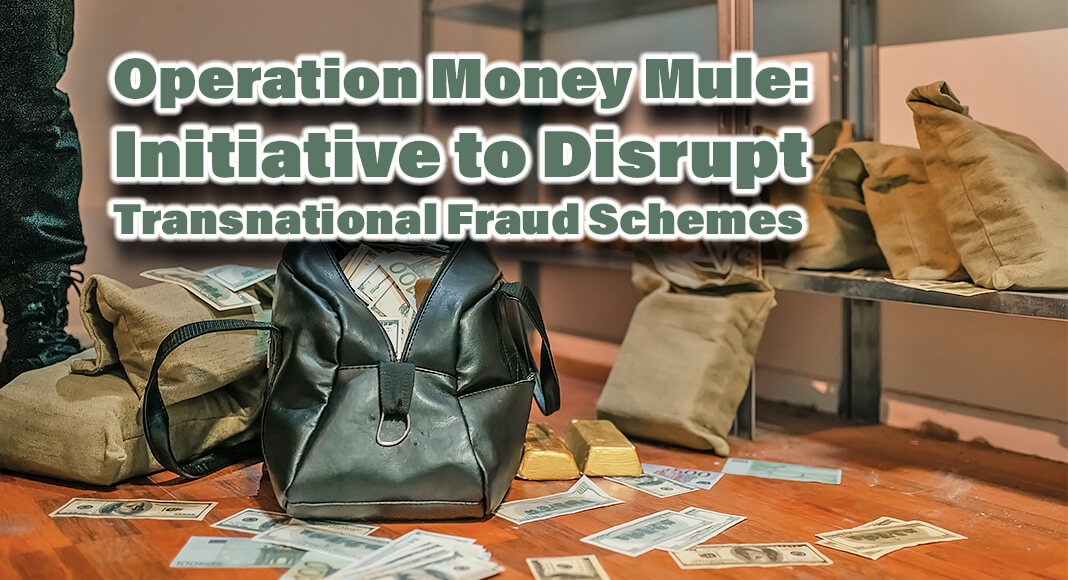
Texas Border Business
U.S. Department of Justice
The Justice Department, FBI, U.S. Postal Inspection Service (USPIS), and other federal law enforcement agencies announced today the completion of the Money Mule Initiative, an annual campaign to identify, disrupt, and criminally prosecute networks of individuals who transmit funds from fraud victims to international fraudsters. Fraudsters rely on money mules to facilitate a range of fraud schemes, including those that predominantly impact older Americans, such as lottery fraud, romance scams and grandparent scams as well as those that target businesses or government pandemic funds.
As part of this year’s initiative, law enforcement took action to stop over 3,000 money mules responsible for facilitating a range of fraud schemes. These thousands of actions ranged from criminal prosecutions designed to punish those intentionally assisting fraudsters to warning letters intended to advise those who may have been unknowingly recruited by fraudsters. Agencies are also conducting outreach to educate the public about how fraudsters use money mules and how to avoid unknowingly assisting fraud by receiving and transferring money.
“The Justice Department is committed to using every tool at our disposal to protect Americans from fraud,” said Acting Associate Attorney General Benjamin C. Mizer. “By working with our federal partners to disrupt money mule networks, educate consumers about scams, and prosecute criminals, we can keep money out of the hands of international fraudsters and in the pockets of hard-working Americans.”
“The FBI and its partners will relentlessly pursue individuals looking to illegally move funds for illicit purposes,” said Assistant Director Michael Nordwall of the FBI’s Criminal Investigative Division. “Our work of protecting the American people includes prosecuting individuals and networks who knowingly facilitate fraud schemes, while educating consumers and unwitting participants on the dangers of illicit money mule networks.”
“The dismantling of these criminal networks should send a strong message that the U.S. Postal Inspection Service, along with our partners, is committed to taking down these criminal networks designed to inflict financial harm, oftentimes to our most vulnerable population, older Americans,” said Inspector in Charge Eric Shen of USPIS. “The Inspection Service will continue to participate in public education efforts, while remaining committed to enforcing the laws that bring money mules and their international puppeteers to justice.”
This year’s effort was coordinated by the Justice Department’s Consumer Protection Branch, FBI, and USPIS. Other participating agencies were the Department of Labor Office of Inspector General, Federal Deposit Insurance Corporation Office of Inspector General, U.S. Immigration and Customs Enforcement’s Homeland Security Investigations (HSI), and IRS Criminal Investigation (IRS-CI).
Participating agencies served approximately 2,970 letters warning individuals that their actions were facilitating fraud schemes. Many money mules begin as victims of romance or lottery scams and are unknowingly lured by fraudsters into transmitting fraud proceeds based on lies. Other money mules are recruited into what they initially believe to be legitimate work-at-home jobs. In order to educate and deter these types of unknowing money mules, the letters served by law enforcement warned individuals that their activities are facilitating fraud and outlined the potential consequences of continuing to transmit illegally acquired funds.
Additionally, more than 20 individuals were criminally charged for knowingly receiving and forwarding victim funds or otherwise laundering fraud proceeds. These cases included:
- The Consumer Protection Branch and the U.S. Attorney’s Office for the District of New Jersey charged five defendants for allegedly acting as couriers who went to the homes of elderly victims of a grandparent scam to pick up cash, often using false names and providing victims with fake receipts. The couriers then brought the cash to other members of the conspiracy, who sent the victims’ money to the Dominican Republic.
- The U.S. Attorney’s Office for the Western District of North Carolina charged two men for allegedly laundering over $4.5 million in proceeds of business email compromise schemes and online romance scams targeting elderly victims. The defendants opened bank accounts to receive wires and other transfers of funds from fraud victims. The defendants then withdrew and transferred the fraud proceeds, including transfers into overseas accounts, and kept a portion of the proceeds for themselves.
- The U.S. Attorney’s Office for the Eastern District of Missouri charged three men for their roles in allegedly collecting and transmitting funds from victims of a nationwide tech support fraud scam targeting the elderly. According to charges, one of the defendants recruited college students to act as couriers to collect payments from victims around the country and to fraudulently open bank accounts into which the proceeds of the scam would be deposited. The other two defendants allegedly provided the couriers with assignments, instructions, and payment. The defendants deposited about $7 million in cashier’s checks into one bank account between March 2020 and July 2023.
As in past years, participating agencies are also working to raise public awareness about how fraudsters recruit and use individuals to assist their fraud operations. IRS-CI implemented a public awareness campaign to warn taxpayers about the ways in which fraudsters recruit money mules. Additionally, the Justice Department and USPIS partnered with the American Banking Association Foundation to present a webinar to banks regarding money mules and the role banks can play in identifying and stopping them.
The agencies involved in this effort urge consumers to be on the lookout for signs someone is trying to recruit them to receive and transmit fraud proceeds. Do not agree to receive money or checks mailed to you or sent to your bank account for someone you have met over the phone or online. Do not open a bank or cryptocurrency account at someone else’s direction. Fraudsters will lie to persuade you to help them. They may falsely tell you that they are helping you get a lottery prize, initiate a purported romantic relationship and then tell you that they need money, or pretend to offer you a job, an opportunity to invest in a business venture, or the chance to help in a charitable effort.
If you or someone you know is age 60 or older and has experienced financial fraud, experienced professionals are standing by at the National Elder Fraud Hotline: 1-833-FRAUD-11 (1-833-372-8311). This Justice Department hotline, managed by the Office for Victims of Crime, can provide personalized support to callers by assessing the needs of the victim and identifying relevant next steps. Case managers will identify appropriate reporting agencies, provide information to callers to assist them in reporting, connect callers directly with appropriate agencies, and provide resources and referrals, on a case-by-case basis. Reporting is the first step. Reporting can help authorities identify those who commit fraud and reporting certain financial losses due to fraud as soon as possible can increase the likelihood of recovering losses. The hotline is open Monday through Friday from 10:00 a.m. to 6:00 p.m. ET. English, Spanish, and other languages are available. The Federal Trade Commission also provides a hotline at 877-FTC-HELP and a website at www.ftccomplaintassistant.gov to receive consumer complaints.
More information about the Department’s efforts to help American seniors is available at its Elder Justice Initiative webpage. For more information about the Consumer Protection Branch and its enforcement efforts, visit www.justice.gov/civil/consumer-protection-branch. The Justice Department provides information about a variety of resources relating to elder fraud victimization through its Office for Victims of Crime, which are available at www.ovc.gov.
Updated May 10, 2024














